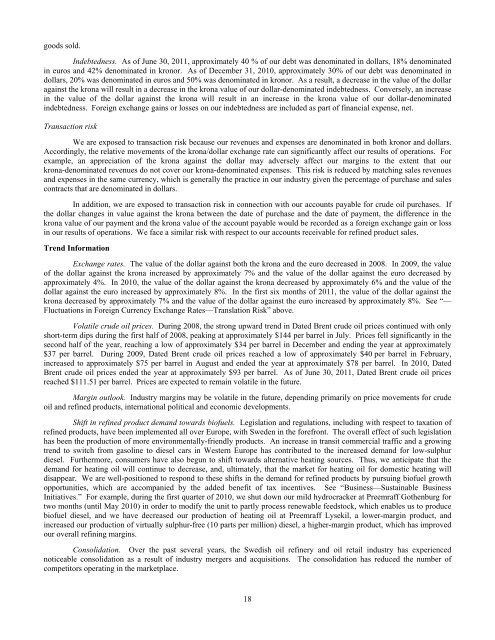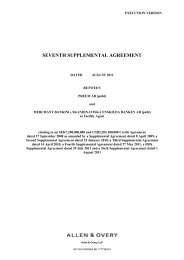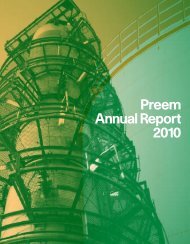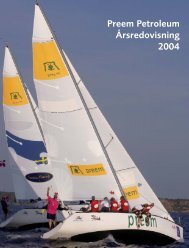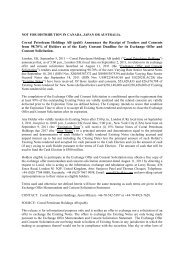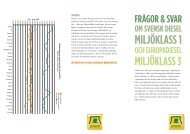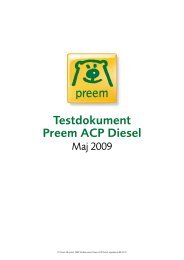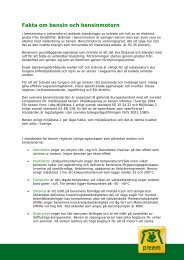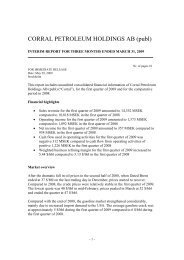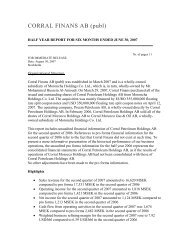Corral Petroleum Holdings AB (publ) Business Update ... - Preem
Corral Petroleum Holdings AB (publ) Business Update ... - Preem
Corral Petroleum Holdings AB (publ) Business Update ... - Preem
Create successful ePaper yourself
Turn your PDF publications into a flip-book with our unique Google optimized e-Paper software.
goods sold.Indebtedness. As of June 30, 2011, approximately 40 % of our debt was denominated in dollars, 18% denominatedin euros and 42% denominated in kronor. As of December 31, 2010, approximately 30% of our debt was denominated indollars, 20% was denominated in euros and 50% was denominated in kronor. As a result, a decrease in the value of the dollaragainst the krona will result in a decrease in the krona value of our dollar-denominated indebtedness. Conversely, an increasein the value of the dollar against the krona will result in an increase in the krona value of our dollar-denominatedindebtedness. Foreign exchange gains or losses on our indebtedness are included as part of financial expense, net.Transaction riskWe are exposed to transaction risk because our revenues and expenses are denominated in both kronor and dollars.Accordingly, the relative movements of the krona/dollar exchange rate can significantly affect our results of operations. Forexample, an appreciation of the krona against the dollar may adversely affect our margins to the extent that ourkrona-denominated revenues do not cover our krona-denominated expenses. This risk is reduced by matching sales revenuesand expenses in the same currency, which is generally the practice in our industry given the percentage of purchase and salescontracts that are denominated in dollars.In addition, we are exposed to transaction risk in connection with our accounts payable for crude oil purchases. Ifthe dollar changes in value against the krona between the date of purchase and the date of payment, the difference in thekrona value of our payment and the krona value of the account payable would be recorded as a foreign exchange gain or lossin our results of operations. We face a similar risk with respect to our accounts receivable for refined product sales.Trend InformationExchange rates. The value of the dollar against both the krona and the euro decreased in 2008. In 2009, the valueof the dollar against the krona increased by approximately 7% and the value of the dollar against the euro decreased byapproximately 4%. In 2010, the value of the dollar against the krona decreased by approximately 6% and the value of thedollar against the euro increased by approximately 8%. In the first six months of 2011, the value of the dollar against thekrona decreased by approximately 7% and the value of the dollar against the euro increased by approximately 8%. See “—Fluctuations in Foreign Currency Exchange Rates—Translation Risk” above.Volatile crude oil prices. During 2008, the strong upward trend in Dated Brent crude oil prices continued with onlyshort-term dips during the first half of 2008, peaking at approximately $144 per barrel in July. Prices fell significantly in thesecond half of the year, reaching a low of approximately $34 per barrel in December and ending the year at approximately$37 per barrel. During 2009, Dated Brent crude oil prices reached a low of approximately $40 per barrel in February,increased to approximately $75 per barrel in August and ended the year at approximately $78 per barrel. In 2010, DatedBrent crude oil prices ended the year at approximately $93 per barrel. As of June 30, 2011, Dated Brent crude oil pricesreached $111.51 per barrel. Prices are expected to remain volatile in the future.Margin outlook. Industry margins may be volatile in the future, depending primarily on price movements for crudeoil and refined products, international political and economic developments.Shift in refined product demand towards biofuels. Legislation and regulations, including with respect to taxation ofrefined products, have been implemented all over Europe, with Sweden in the forefront. The overall effect of such legislationhas been the production of more environmentally-friendly products. An increase in transit commercial traffic and a growingtrend to switch from gasoline to diesel cars in Western Europe has contributed to the increased demand for low-sulphurdiesel. Furthermore, consumers have also begun to shift towards alternative heating sources. Thus, we anticipate that thedemand for heating oil will continue to decrease, and, ultimately, that the market for heating oil for domestic heating willdisappear. We are well-positioned to respond to these shifts in the demand for refined products by pursuing biofuel growthopportunities, which are accompanied by the added benefit of tax incentives. See “<strong>Business</strong>—Sustainable <strong>Business</strong>Initiatives.” For example, during the first quarter of 2010, we shut down our mild hydrocracker at <strong>Preem</strong>raff Gothenburg fortwo months (until May 2010) in order to modify the unit to partly process renewable feedstock, which enables us to producebiofuel diesel, and we have decreased our production of heating oil at <strong>Preem</strong>raff Lysekil, a lower-margin product, andincreased our production of virtually sulphur-free (10 parts per million) diesel, a higher-margin product, which has improvedour overall refining margins.Consolidation. Over the past several years, the Swedish oil refinery and oil retail industry has experiencednoticeable consolidation as a result of industry mergers and acquisitions. The consolidation has reduced the number ofcompetitors operating in the marketplace.18


